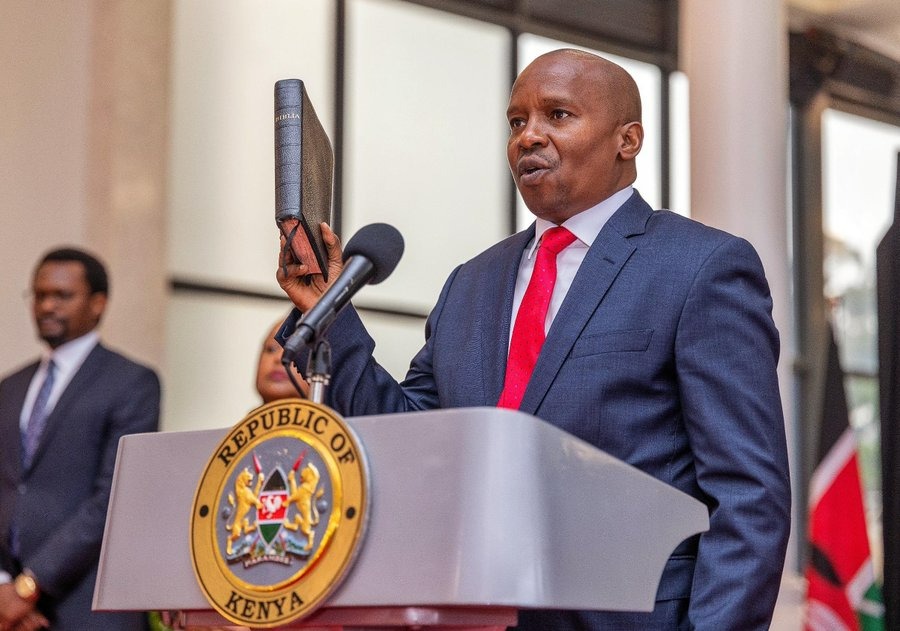
To begin with, let me take this opportunity to belatedly congratulate Prof Kindiki Kithure who was sworn in as the third Deputy President of our beloved country.
May he lead and serve to the spirit of the oath of office he took in the full glare of the public eye.
Fast forward, his rise to the Deputy President
position means President William Ruto may end up filling the Interior CS position with
a new face.
The docket is currently being held in acting
capacity by Prime Cabinet Secretary Musalia Mudavadi but this will surely
change because such a serious position can’t be held in acting capacity.
For the two years, Prof Kindiki served as the
Interior Cabinet Secretary, his biggest assignment was to work round the clock
and use whatever means to put a permanent end to banditry in the North
Rift and other regions in Kenya that have been dragged behind by cattle
rustling.
Immediately after the current administration took over, President William Ruto said the military would be deployed in all banditry-prone areas to complement efforts by Kenyan police officers to combat the vice.
Indeed, this was done under the tutelage of Prof Kindiki as a short-term measure to whisk away the bandits who were regrouping
quickly and fast, giving local residents sleepless nights.
The deployment of military officers was received
with mixed reactions but eventually proved to be effective.
However, we have to applaud the Ministry of Interior for acknowledging the deployment of military officers and the presence of heavy police machinery won’t serve as a long-lasting solution.
The ministry
shifted its focus to education as a long-term solution to enhance peace and
provide economic growth in the region.
The ministry further recognised the need to allow more religious activities that can be used for public sensitisation and imparting a strong culture change.
This was a timely move aimed at achieving a complete transformation that can boost growth economically and open up young people to new challenges.
Prof Kindiki, working together with the Ministry of
Education listed programmes such as construction of new schools and providing
them with adequate materials to empower the residents and reduce the chances of
communities resorting to conflict and criminal activities.
His plan to engage legislators and the county
governments to help in formulating policies that can help students develop
skills and explore career opportunities is definitely going to be magic but in
the long run.
Worldwide, it is well documented that better educational outcomes are strongly associated with higher levels of peacefulness.
This includes reductions in internal conflicts, and interpersonal
violence, and an overall increase in socio-political stability.
A good example is Nepal which adopted a new constitution in 2015, transitioning to democracy post the civil war which ended in 2000.
Over the last 20 years, the country significantly increased its
education spending, focusing on learning outcomes and equitable access.
This aligned with improved secondary school completion rates and a 30-place rise in global peace rankings since 2008, attributed mainly to reduced internal conflict.
With financial support
from the Global Partnership for Education since 2009, these educational
investments coincided with substantial improvements in its ongoing conflict
score in the Global Peace Index.
It is going to be the same case in the North Rift
where education will promote understanding and tolerance by exposing respective
communities to diverse positive cultures, perspectives, and ideas.
Whoever takes over from Kindiki must not drop the
ball in any way but rather take this initiative a notch higher.
Whoever the person will be must also work with governors from Turkana, Elgeyo Marakwet, West Pokot and Baringo counties to
enhance their unity and advocate economic investment and also promote
initiatives to foster peace.
We must recognise that for us to find a lasting
solution to banditry and cattle rustling menace, the counties on their own
should come up with a joint strategy of utilising available resources and
allocation of resources to boost industrial development and create employment
opportunities.
This is because countries face similar challenges
that require unity of purpose to find lasting solutions through harnessing
their joint economic power, potentials and resources.
By doing so, the governors would open doors for
residents including the youth some of whom have been involved in acts of
lawlessness, to do business and foster international trade.
There is no doubt that other than security
operations, governors, Members of Parliament, Members of County Assemblies, councils of elders and religious leaders should work with the National Government to address the cultural, political, social and economic
challenges that have escalated the conflict.
Elcana Jacob is a criminologist, security expert and communication consultant











